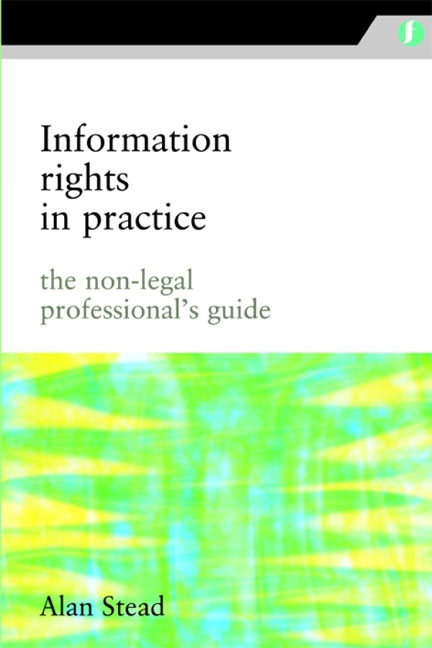Book contents
- Frontmatter
- Contents
- Acknowledgements
- Table of statutes and case law
- Abbreviations
- 1 Introduction
- 2 Data Protection Act 1998
- 3 Definitions of personal data
- 4 The scope of the Data Protection Act
- 5 The data protection principles
- 6 Access to personal data
- 7 Data sharing
- 8 The Freedom of Information Act 2000 and Environmental Information Regulations 2004, SI 2004/3391
- 9 Scope of the Freedom of Information Act 2000 and the Environmental Information Regulations 2004
- 10 Application of exemptions and exceptions
- 11 The public interest test
- 12 Publication schemes
- 13 Compliance, the Information Commissioner and the Information Tribunal
- 14 Disclosure logs
- 15 Records management – Section 46 code of practice
- 16 Other legislation
- 17 Interaction of the legislation
- 18 Summary
- Appendix 1 Data protection principles
- Appendix 2 Flow chart of FOI
- Appendix 3 Exemptions and exceptions under the Freedom of Information Act 2000 and the Environmental Information Regulations 2004
- Appendix 4 Bibliography and useful web addresses
- Appendix 5 Published standards for records management
- Index
3 - Definitions of personal data
Published online by Cambridge University Press: 09 June 2018
- Frontmatter
- Contents
- Acknowledgements
- Table of statutes and case law
- Abbreviations
- 1 Introduction
- 2 Data Protection Act 1998
- 3 Definitions of personal data
- 4 The scope of the Data Protection Act
- 5 The data protection principles
- 6 Access to personal data
- 7 Data sharing
- 8 The Freedom of Information Act 2000 and Environmental Information Regulations 2004, SI 2004/3391
- 9 Scope of the Freedom of Information Act 2000 and the Environmental Information Regulations 2004
- 10 Application of exemptions and exceptions
- 11 The public interest test
- 12 Publication schemes
- 13 Compliance, the Information Commissioner and the Information Tribunal
- 14 Disclosure logs
- 15 Records management – Section 46 code of practice
- 16 Other legislation
- 17 Interaction of the legislation
- 18 Summary
- Appendix 1 Data protection principles
- Appendix 2 Flow chart of FOI
- Appendix 3 Exemptions and exceptions under the Freedom of Information Act 2000 and the Environmental Information Regulations 2004
- Appendix 4 Bibliography and useful web addresses
- Appendix 5 Published standards for records management
- Index
Summary
Introduction
The Data Protection Act 1998 only applies to living individuals and describes two different types of personal data. The first relates to most of the data held about individuals and the second to sensitive personal data which it then goes on to define. The first test of data is always, ‘Is it personal?’, and only if this condition is met can the sensitive data test be applied.
Personal data can be held, as will be seen in Chapter 5, without specific consent of the subject so long as they are aware that the data is being held and why. Sensitive data can only be held with specific consent and this will be examined later in this chapter.
The definition of personal data is vital to the operation not only of this Act but also of the other main legislation in the information rights set. These remaining enactments both have sections which exempt personal data from their provisions. In the Freedom of Information Act 2000 this is section 40 and in the Environmental Information Regulations 2004 it is regulation 13.
The Act itself leaves this area open to some interpretation. Section 1(1) describes personal data as follows:
‘Personal data’ means data which relate to a living individual who can be identified
(a) from those data, or
(b) from those data and other information which is in the possession of, or is likely to come into the possession of, the data controller, and includes any expression of opinion about an individual and any indication of the intentions of the data controller or any other person in respect of the individual.
(DPA 1998, s. 1(1))Deceased persons
Firstly the Act only applies to living individuals. Data of persons who are deceased no longer come under the Act although there are other laws which relate to this type of data. Examples of some of these are: Access to Health Records Act 1990 (this relates to access by the next of kin to health records of the deceased), Local Government Finance Act 1992 (as it relates to council tax data), and Human Rights Act 1998, Article 8 of Schedule 1 (this article, lifted from the European directive, gives everyone the right to respect for his private and family life, his home and his correspondence).
- Type
- Chapter
- Information
- Information Rights in PracticeThe non-legal professional's guide, pp. 13 - 20Publisher: FacetPrint publication year: 2008
- 1
- Cited by



